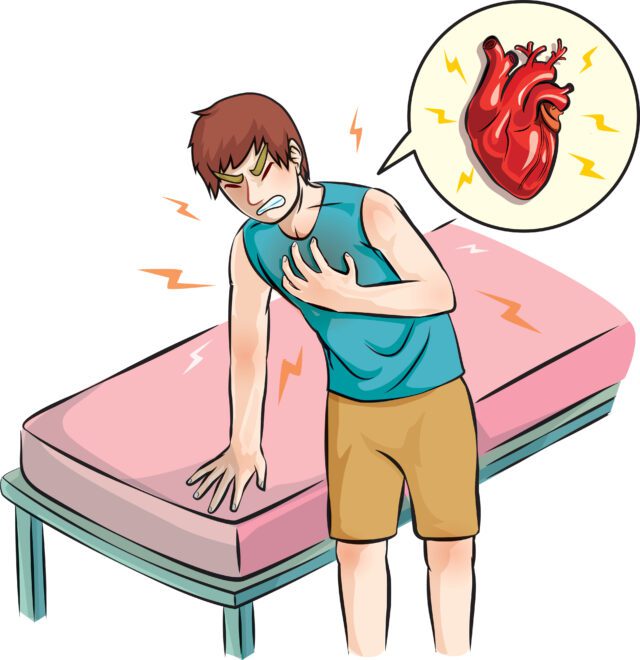Holiday Health Concerns: Why Do Heart Attacks Spike During the Holiday Season? And Are There Really More Suicides?
The holidays are supposed to be all about happiness and joy, family and friends, opening gifts and enjoying delicious food… not to mention those visions of sugarplums. But with all these “warm-fuzzy” things, there is a reality that one must consider: your health.
In this article, we’ll take a look at two very important health concerns that actually may become more of a concern during the holiday season: heart attacks and depression.
Heart Attacks Increase during the Holiday Season
It’s been statistically proven time and again: heart attacks spike during the winter holiday season. One study even showed that these spikes happen especially around Christmas Day and New Year’s Day. So the question is… WHY?
Many experts believe that there are certain cardiovascular “triggers” which are more prevalent around the holidays that prey on existing stress on the heart (such as smoking, hypertension, high cholesterol, diabetes, lack of exercise, and age).
One trigger, which doesn’t necessarily explain the spikes specifically on Christmas Day and New Year’s Day, but does contribute, is cold weather. Frigid temps can cause blood vessels to constrict, which bumps up blood pressure; and blood also clots more easily. Chilly weather puts strain on the heart overall, and physical activity – such as shoveling snow, or going for a run – can trigger a heart attack.
Again, this factor doesn’t fully explain the increase in heart episodes on those specific holiday days… so what might? Researchers at the University of California, San Diego, and Tufts University School of Medicine, who conducted a national study examining 3 million U.S. death certificates from 1973 to 2001, have some suggestions.
For one, people tend to put off getting medical help if they are feeling initial symptoms of a heart attack – simply because they don’t want to disrupt holiday festivities with family and/or friends. Or, they may mistake those symptoms for indigestion from that huge holiday feast. Second, those who travel for the holidays may not know where to find the care they need if they’re in an unfamiliar place.
Finally, there’s the “overindulgence factor.” People tend to eat more (and more “bad” food), drink more, and take a break from their exercise routine. If you’re teetering on any of the existing conditions mentioned above, that’s a really bad idea. Extra weight and extra salt can place extra stress on the heart, which can increase your risk of an episode.
To avoid these triggers, you just have to be smart. Avoid being outdoors unnecessarily in freezing temps; and if you have to be, make sure you dress appropriately for the weather.
Avoid anything that will put extra stress on your heart – including gaining weight, eating a lot of salt, strenuous activity, and drinking too much. Binge drinking can lead to atrial fibrillation, which increases your risk of stroke, heart attack and heart failure. Remember, you want to be able to celebrate this holiday season with the ones you love… and not while hooked up to an IV in the hospital!
Depression during the Holiday Season
While the “suicide myth” (that there are more suicides during the holidays) has been proven to be just that, there’s no denying that instances of depression during the holidays see an increase. And when you think about it, why wouldn’t they? People with no real family to share the season with, single folks who don’t have that loved one with which to exchange gifts, elderly individuals whose families have better things to do than visit them in the nursing home… the list goes on and on. Plus, the holiday can bring back painful memories of family members and friends that have passed away – whether it was recent or long past, or “before their time” or not.
So, if you’re one of the above mentioned, or just are feeling down amongst the hustle and bustle of the holidays, what can you do to help prevent – or at least help manage – the stress and depression this time of year can bring?
The Mayo Clinic offers some helpful tips for those who are suffering.
Don’t deny what you’re feeling. It’s perfectly OK if you are feeling depressed. We’ve come a long way as a society in “accepting” people who suffer from depression and anxiety, and you should have no shame whatsoever if you’re one of those individuals. Recognize what you’re feeling, and don’t be afraid to express those emotions. A good cry may do wonders.
Reach out to others. Even if you don’t have many close friends or family members (“close” in either proximity or relationship), there are people out there who you can turn to. Community outreach groups, religious groups, or other socially-based activities may all offer a listening ear, or shoulder to cry on. If you’re particularly lonely, but don’t feel like any of the aforementioned options, try volunteering at a local food shelf or shelter. Those types of settings are often extremely welcoming (especially this time of year), and my help warm your soul.
Don’t turn to unhealthy habits. It’s easy enough to drown your sorrows in alcohol, food, or even drugs when you’re feeling down. And the holiday season may heighten that desire even more. But instead, try going for a long walk, or take a yoga class. It’s amazing what physical activity can do for your mood – and it’s proven! Exercise boosts production of your brain’s feel-good neurotransmitters, called endorphins. And while sleep is important for mental health, make sure you’re not slumbering too much as it can have the opposite effect.
Seek professional health if deemed necessary. If you’re feeling especially down in the dumps, or overwhelmed to the point where you just don’t know where to turn – particularly if you’ve been feeling this way for a while, it might be time to seek the help of a mental health professional. Again – there’s no shame in that! These professionals exist for a reason… to help those in need. And you don’t have to go to some expensive psychiatrist either. Many communities have programs that allow for free or reduced care.
As we enter into the flurry of days of the holiday season, we hope that you keep your health top of mind!









